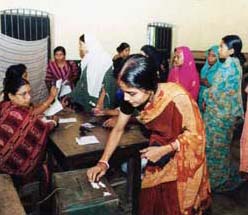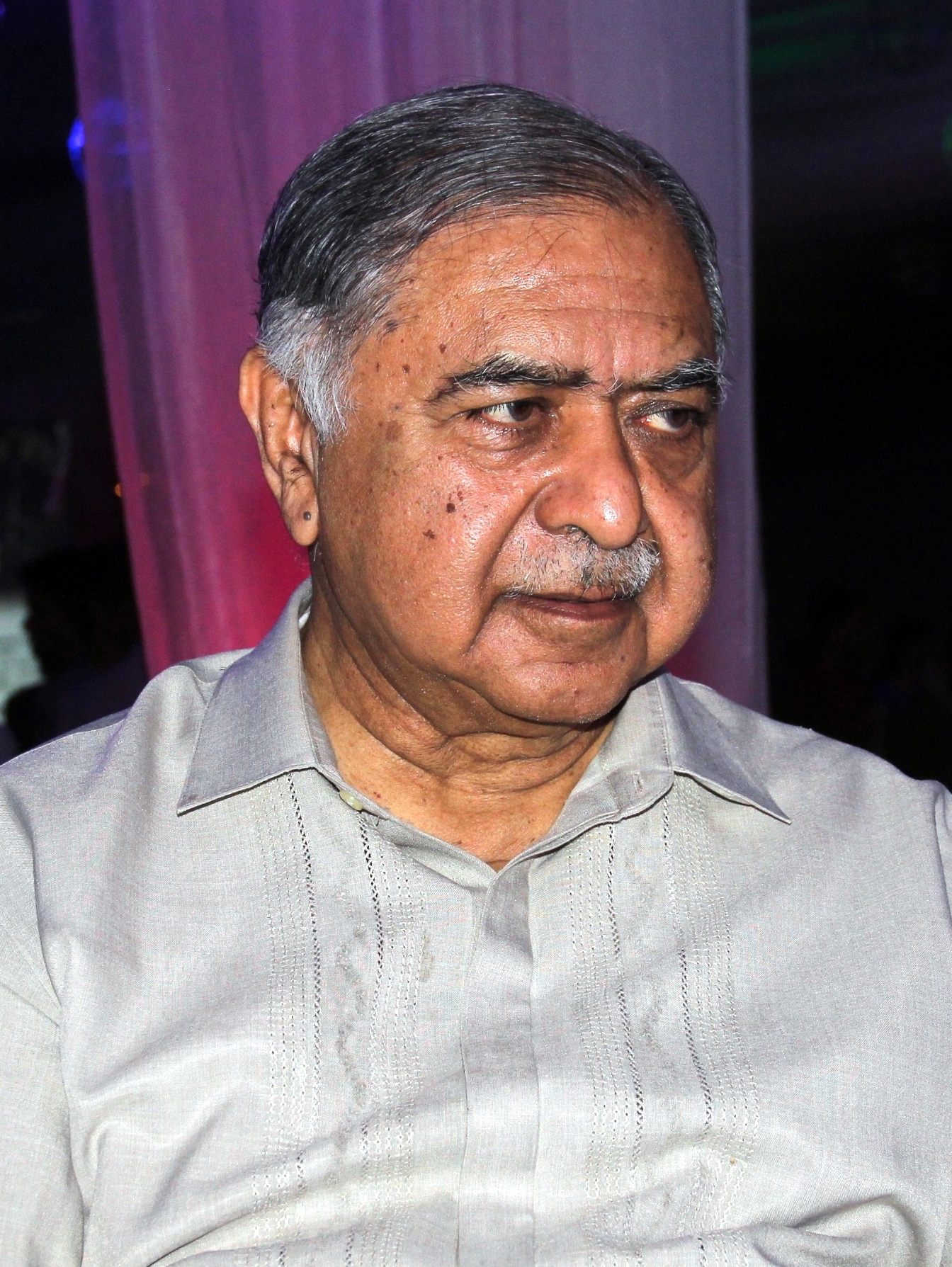|
Elections In Bangladesh
Bangladesh elects on national level a legislature with one house or chamber. The unicameral Jatiyo Sangshad, meaning national parliament, has 350 members of which 300 members are directly elected through a national election for a five-year term in single-seat constituencies while 50 memberships are reserved for the women who are selected by the ruling party or coalition. The Prime Minister is the head of the government. The president who is the head of the state is elected by the National Parliament. The president of Bangladesh is a ceremonial post and does not exercise any control over the running of the state. Prior to the 2024 Bangladesh constitutional crisis, the country had a two-party system that had evolved over time since the election of 1991. Two political parties or coalitions dominated, one headed by Bangladesh Awami League and the other by Bangladesh Nationalist Party, making it difficult for anybody to achieve electoral success under the banner of any other party. ... [...More Info...] [...Related Items...] OR: [Wikipedia] [Google] [Baidu] |
1996 Bangladeshi Presidential Election
{{bangladesh-election-stub ...
The Bangladeshi presidential election of 1996 was held on July 23, 1996. Shahabuddin Ahmed was elected after being nominated by the ruling party. He replaced Abdur Rahman Biswas when his five-year term came to an end. His inauguration ceremony was held October 9, 1996. References Presidential Bangladeshi presidential election Presidential elections in Bangladesh Presidential election A presidential election is the election of any head of state whose official title is President. Elections by country Albania The president of Albania is elected by the Assembly of Albania who are elected by the Albanian public. Chile The p ... [...More Info...] [...Related Items...] OR: [Wikipedia] [Google] [Baidu] |
1991 Bangladeshi Presidential Election
The 1991 Bangladeshi presidential election was held on October 8, 1991. This was the first indirect election after the restoration of the parliamentary system. Abdur Rahman Biswas was nominated by the ruling party and Badrul Haider Chowdhury was nominated by Bangladesh Awami League. That time Awami League nominated candidate Justice Badrul Haider Chowdhury was defeated by BNP's Abdur Rahman Biswas. In the election, Abdur Rahman Biswas got 172 votes and Badrul Haider Chowdhury got 92 votes. Abdur Rahman Biswas took the oath of office of the President and took office on 10 October 1991. This was the last contested presidential election in Bangladesh. References Presidential Bangladesh Bangladesh, officially the People's Republic of Bangladesh, is a country in South Asia. It is the List of countries and dependencies by population, eighth-most populous country in the world and among the List of countries and dependencies by ... Presidential elections in Bangladesh Octob ... [...More Info...] [...Related Items...] OR: [Wikipedia] [Google] [Baidu] |
1986 Bangladeshi Presidential Election
Presidential elections were held in Bangladesh on 15 October 1986. The result was a victory for incumbent Hussain Muhammad Ershad, who had assumed the office in 1983 following a military coup. Ershad reportedly won 84% of the vote with a voter turnout of 55%. However the elections were controversial as they were boycotted by all major opposition candidates and there were reports of irregularities. Background In 1982 a coup d'état led by Army Chief Hussain Muhammad Ershad overthrew democratically elected President Abdus Sattar. Parliament was dissolved and all political activity was banned. Ershad appointed Justice A. F. M. Ahsanuddin Chowdhury as President on 27 March 1982, a position which he held until December 1983 when Ershad assumed the presidency himself. In 1983 Ershad promised to hold presidential elections in May 1984 and to restore parliamentary government the following year. However, neither elections were held until 1986. Amid opposition from the general public, E ... [...More Info...] [...Related Items...] OR: [Wikipedia] [Google] [Baidu] |
1981 Bangladeshi Presidential Election
Presidential elections were held in Bangladesh on 15 November 1981. The result was a victory for the incumbent acting President Abdus Sattar (president), Abdus Sattar of the Bangladesh Nationalist Party (BNP), who received 66% of the vote, beating his principal challenger Kamal Hossain of the Bangladesh Awami League, Awami League. Voter turnout was 57%. Background On 30 May 1981 president Ziaur Rahman was Assassination of Ziaur Rahman, assassinated by a faction of rebel officers of the Bangladesh Army. Following the assassination, Vice President of Bangladesh, Vice President Abdus Sattar (president), Abdus Sattar automatically became the acting president, despite being in hospital at the time. Speaking to foreign reporters in Bangabhaban on 4 June, Sattar announced that in line with the constitution, elections would be held within 180 days of the death of the former president, to "foil any conspiracy to disturb the democratic process in the country." Campaign According to the New ... [...More Info...] [...Related Items...] OR: [Wikipedia] [Google] [Baidu] |
1978 Bangladeshi Presidential Election
Presidential elections were held in Bangladesh on 3 June 1978. They were the first direct elections for presidency in the country, as the president had previously been elected by the Jatiya Sangsad. The result was a victory for Ziaur Rahman, who received 77% of the vote. Voter turnout was 54%. They were the first presidential elections since the August 1975 coup that overthrew and killed president Sheikh Mujibur Rahman and led to a military regime. The 1978 elections were called by the regime to lend legitimacy to its rule. The elections took place amid martial law, repression of the political opposition and curtailment of press freedoms. Other political parties were weakly organized. Campaign Prior to the elections six parties backing Ziaur Rahman – the Bangladesh Labour Party, the Bangladesh Muslim League, the Bangladesh Scheduled Caste Federation, Jatiyatabadi Ganatantrik Dal, the National Awami Party (Bhashani) and the United Peoples' Party – formed the Jatiyatabadi Fro ... [...More Info...] [...Related Items...] OR: [Wikipedia] [Google] [Baidu] |
1974 Bangladeshi Presidential Election
The first indirect presidential election was held on 24 January 1974. This was the first and last presidential election under a parliamentary system before the presidential system was introduced in January 1975. Mohammad Mohammadullah was elected as the president by the National Assembly without any voting since there were no other candidates. Mohammad Mohammadullah was sworn in at Bangabhaban on 27 January 1974. References 1974 elections in Bangladesh Bangladesh Bangladesh, officially the People's Republic of Bangladesh, is a country in South Asia. It is the List of countries and dependencies by population, eighth-most populous country in the world and among the List of countries and dependencies by ... Presidential elections in Bangladesh January 1974 in Bangladesh {{bangladesh-election-stub ... [...More Info...] [...Related Items...] OR: [Wikipedia] [Google] [Baidu] |
Sheikh Hasina
Sheikh Hasina (''née'' Wazed; born 28 September 1947) is a Bangladeshi politician who served as the tenth prime minister of Bangladesh from June 1996 to July 2001 and again from January 2009 to August 2024. Premiership of Sheikh Hasina, Her second term in office, which critics characterized as a dictatorship, ended in self-imposed exile following the July Revolution (Bangladesh), July Revolution in 2024. Hasina is the daughter of Sheikh Mujibur Rahman, Bangladesh's President of Bangladesh, founding president, and is a member of the Tungipara Sheikh family, Tungipara Sheikh political family. She had little presence in politics before Assassination of Sheikh Mujibur Rahman, her father's assassination in August 1975. Afterwards, she took asylum in India and became involved with the Awami League and was elected as its president, a position which she continues to hold to this day while residing in India. After returning to Bangladesh in 1981, she and her party Awami League became ... [...More Info...] [...Related Items...] OR: [Wikipedia] [Google] [Baidu] |
Rowshan Ershad
Begum Rowshan Ershad (born 19 July 1943) is a Jatiya Party (Ershad), Jatiya Party politician from Bangladesh. She was the former Jatiya Sangsad member from the Mymensingh-4 constituency and the former Leader of the Opposition (Bangladesh), leader of the opposition in the 2018 Bangladeshi general election, 11th parliament. She is the chief patron of the Jatiya Party (Ershad) and the widow of former Bangladesh president Hussain Muhammad Ershad. Political career As the first lady during 1982–1990, Ershad was active in social welfare and in promoting the rights of women and children. She was the chief patron of the Bangladesh Jatiya Mohila Sangstha. In 1975, Ershad became the founder-president of the Sena Paribar Kalyan Samity (Armed Forces Family Welfare Association). She attended the UN Special Convention on Drug Abuse in 1985. In November 2023, Ershad announced she would not participate at the 2024 Bangladeshi general election. In May 2025, Ershad's ancestorial home in Mymensi ... [...More Info...] [...Related Items...] OR: [Wikipedia] [Google] [Baidu] |
June 1996 Bangladeshi General Election
Snap general elections were held in Bangladesh on 12 June 1996. They were called following the controversial February 1996 elections, which were boycotted by the opposition and saw a turnout of just 21%. The result of the snap elections was a victory for the Bangladesh Awami League, which won 146 of the 300 directly elected seats, resulting in its leader Sheikh Hasina becoming Prime Minister. It was the first election victory for the Awami League since 1973 and the party's removal from power in a 1975 coup. Voter turnout was 75%, the highest to date. Background The June 1996 elections were the second general elections to be held within a four-month period. Previously in February, a general election had been held which was boycotted by all major opposition parties. The opposition were demanding the installation of a neutral caretaker government to oversee the election, citing a 1994 by-election (which they alleged to have been rigged) as evidence of the BNP's inability to hold ... [...More Info...] [...Related Items...] OR: [Wikipedia] [Google] [Baidu] |
Caretaker Government
A caretaker government, also known as a caretaker regime, is a temporary ''ad hoc'' government that performs some governmental duties and functions in a country until a regular government is elected or formed. Depending on specific practice, it consists of either randomly selected members of parliament or outgoing members until their dismissal. Caretaker governments in representative democracies are usually limited in their function, serving only to maintain the '' status quo'', rather than truly govern and propose new legislation. Unlike the government it is meant to temporarily replace, a caretaker government does not have a legitimate mandate (electoral approval) to exercise aforementioned functions. Definition Caretaker governments may be put in place when a government in a parliamentary system is defeated in a motion of no confidence, or in the case when the house to which the government is responsible is dissolved, to be in place for an interim period until an electi ... [...More Info...] [...Related Items...] OR: [Wikipedia] [Google] [Baidu] |


